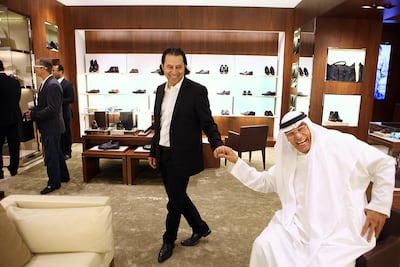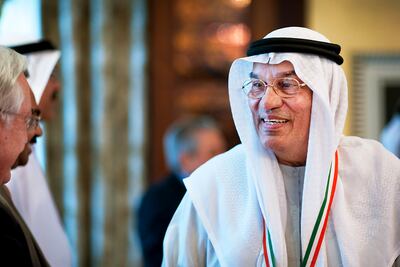On any given day, you might find Mohan Jashanmal outside one of his family's stores, perhaps the one at Abu Dhabi Mall.
Clad in a khandoura and traditional Emirati headscarf, the India native greets passersby, urging them to come in and have a look around.
He ignores the chagrined store manager who is beseeching him to come inside and have a seat. His place, he believes, is outside the entrance.
"I'm the doorman, the customer is the boss," he says. "Without the customer, we will shut the doors."

Mr Jashanmal has been working the floor of his family's stores ever since he opened an outpost on the Abu Dhabi beach almost half a century ago. Those handful of stores in Gulf capitals have grown into a multibillion-dirham family enterprise with locations throughout the region.
Speaking to Mr Jashanmal is taking a step back in time: trading with oil workers and sheikhs in an Abu Dhabi with no roads or electricity. Indeed, he embodies the UAE's diversity. Born in Karachi, in what was then India, he first went with his family to Bahrain when Jashanmal's opened there.
The Indian Embassy hosted a dinner last November to honour his family empire's 90th anniversary and the patriarch's 71st birthday. Mr Jashanmal wore a khandoura. "It's just like salwar kameez," he says, referring to the tunic set worn by men on the subcontinent. He also spoke partly in Arabic to the guests. For him, the UAE has become home. The country has returned the favour: he is one of the few expatriates here with a permanent residency visa.
We meet in his small office, full of photographs capturing him and Abu Dhabi over time. A novelty store occupies the first floor of the building in one of the capital's older neighbourhoods.
In the middle of our interview, his wife, Vanita Jashanmal Jhangiani, drops by. "Be careful," she tells me, "he talks too much." He giggles and his eyes brighten behind his glasses. "Hey, I'm a salesman."
His tone becomes serious when he talks about customer service, something he believes is at the heart of "Brand Jashanmal".
The customer "has worked hard for that money so give him the due recognition of the value of that money", he says. "Service with a smile, Jashanmal-style."
He grew up in the family's stores, but before he could move up to the helm, Mr Jashanmal was told he had to work for others.

"We have an old saying that first you must learn how to receive orders before you give orders." So, in 1957, he was dispatched to London to work as a salesman for Hoover, the vacuum cleaner company. He walked door-to-door, carrying Hoover's latest model. "I was knocking on the door, putting the foot in the door saying 'madam, you don't have a man cleaning your carpet free of charge every day do you? Ah, no? Well, then I'm here'."
He giggles recounting the expressions on the faces of some of those English homemakers, startled at the sight of an Indian salesman at the door. He'd leave the vacuum for a few days, let the women try it out. "Ninety-nine per cent of the time she would accept it and buy it." He pauses, and then adds: "Of course there were times that I was thrown out also."
He stayed at Hoover for nearly six years, and eventually would fly to various cities in the Gulf and Middle East to both repair existing machines and introduce customers to new products. He honed his sales strategy and his customer-is-king philosophy.
"I wanted to see exactly how I could bring this type of selling to my own local type of selling," he says.
"I was bringing the new concept that the customer will not come to my shop; I will go take it to the customer.
"They are more than welcome to come to my shop but I will go to the customer and do the service in your house."
Years later he would meet Britain's Prince Charles at an embassy event in Abu Dhabi and amused him with tales of his Hoover days and recited the company's old slogan: "It beats as it sweeps as it cleans."
In 1962, Mr Jashanmal was ready to return to the family business. He also got married. His wife, who was known then as Maya Malani, had just completed her university studies in Boston. He says he was a bit concerned how she might react to her new, more rustic, home.
He was right to wonder. As the plane descended for their arrival, his wife scanned the empty terrain below. "Oh my God, Mohan, are we going to crash?"He assured her the plane was not crashing: "That, my dear, is Abu Dhabi."
What she saw back in 1964 was a strip of concrete almost totally obscured by drifting sand dunes. There were no roads to the tent-like buildings lined along the beach about 30 metres from the Gulf.

Unlike many others who set up shop in Abu Dhabi, the Jashanmals had a proper building for their business and its third floor was their first home. The store "was on the Corniche". He stops to contradict himself: "There was no Corniche. There was no water to drink, no electricity. We had our own generators."
Like all pioneers, the family adjusted, working around the hardships of a sparsely settled place. With water so precious, he says "sea baths" were the norm. To take the sting out of having no choice, they would tell each other how much better the buckets-full of salt water were for them. "We would go for a proper bath, really, once a week to Dubai," he says. "Already this water was expensive. What can we do? We would rather have it for cooking and drinking rather than anything else."
Potable water was shipped in diesel barrels and they had to use filters made by Berkefeld to strain the water. Still, "there was the smell of diesel in the water".
Thinking like a salesman, though, he saw an upside. "Berkefeld was a great sell."
In those days, Mr Jashanmal recalls, oil workers and sheikhs alike dropped by the store. While the souk set up by an earlier generation of Indian traders sold more traditional items of silk and copper, Jashanmal's "had all the Made in England: K shoes, Dickie Trousers, Van Heusen shirts".
On a semi-regular basis, British India SN ships carried cargo from the subcontinent that bounced from Gulf port to Gulf port, dropping anchor about a kilometre offshore. Barges would drift out to the steamers, collect the boxes of goods and unload them on to the beach. Dumped haphazardly on the sand, the wooden crates were marked Jashanmal, Khouri or Grand Stores with a stamp or a scrawl in black ink.
"There was no warehouse, nothing," Mr Jashanmal says. "Everybody was told 'OK, go and collect your goods'.
"Next to Jashanmal's was the old custom house, its red and white checked Abu Dhabi flag flying overhead. As the merchants went about collecting their products, Mr Jashanmal says the customs director would approach them about paying their duty.
"I would tell him, do you see customers here? Baba, let me sell and then I'll pay you duty."

Oil had been discovered in Abu Dhabi two years earlier in 1962. The Abu Dhabi National Oil Company would not be formed for another seven years, but oil companies had already set up operations here, bringing in executives and roughnecks. The few women who joined them worked as nurses or teachers.
The small community, comprising a handful of disparate nationalities, formed a tight family. "Nobody felt like he was foreign," Mr Jashanmal says. "Survival was mutual."
Today, the energetic merchant drives a Lexus in an Abu Dhabi that aims to be a world capital of the arts and green energy. Still, he believes that ethos of helping each other do business and make a home is still relevant today, illustrated he says by Abu Dhabi's recent support of Dubai.
"Dubai was bringing the name of the UAE to the world, and even today Abu Dhabi supports that," he says.
Mr Jashanmal has no plans to retire. He still shows up to his office in his dual roles of a board member of Jashanmal National Company and its regional manager for Abu Dhabi. As chairman of the Indian Business Professional Group, he leads delegations abroad, connecting Indian businesses with the world.
Each morning, he starts the day with a walk around his neighbourhood with a pocketful of sweets. He likes to hand them out to labourers, already on the job, tending to esplanade gardens or sweeping the streets. "It makes them smile," he says. "They are working hard. I want to acknowledge that. I introduce myself. I ask them 'have you been to my store'?"ashah@thenational.ae

